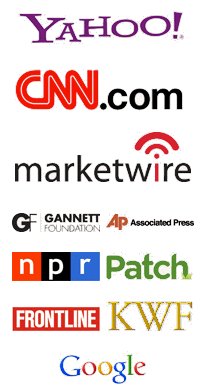
From left: Andrew Noyes, Alicia Shepard and Andy Carvin. Photo by Lauren Slavin/Towson University
When Andrew Noyes, Facebook’s manager of public policy communication, asked a packed room of journalists how many of their news organizations did not have a Facebook page, not a single person raised a hand.
The informal poll proved that many media entities have plunged into social media to engage their audiences. But when Noyes followed up by asking how many of those organizations had commenting policies governing their Facebook pages, only a few hands greeted him, demonstrating an unpreparedness for dealing with online comments that can sometimes be inappropriate or downright caustic.
At the panel “No Comment: Rethinking Online Commentary,” led by NPR ombudsman Alicia Shepard, panelists and audience members discussed and debated policies governing online commenting.
Shepard expressed uncertainty about allowing comments, saying just a few vicious commenters can hijack an entire conversation.
“It got to the point where I wondered whether NPR should even have comments,” Shepard said. But most in the room shared very different views.
Andy Carvin, senior strategist for the social media desk at NPR, said the site only ends up blocking about 1 percent of comments for inappropriateness. “We have to move away from that siege mentality,” he said, “and reward the other 99 percent who are actually trying to be productive members of our community.”
While many in the audience expressed a desire to maintain the conversations on their organizations’ websites and social media pages, no one had a catch-all solution for dealing with the vitriol that can run rampant.

Alicia Shepard, ombudsman for National Public Radio. Photo by Lauren Slavin/Towson University.
The Huffington Post allows commenters to remain anonymous but gives out different “badges” for frequent users, including a moderator badge for users who flag a certain number of inappropriate comments that the news blog ends up deleting, Shepard said.
Other news websites ask users to register with their real identities believing if people cannot hide behind anonymity or pseudonyms, they will be less likely to post abusive and offensive comments.
The Massachusetts Sun-Chronicle takes an extreme approach, requiring users to give not only their names, phone numbers and e-mail addresses, but also valid credit card numbers.
Few are that radical, but many have turned to Facebook as a tool for identity validation, speakers said.
Noyes urges news organizations to take advantage of Facebook’s “real-name culture” for comments.
But while he said he believes in the power of comments sections, especially those powered by Facebook, he got rid of his own personal comments section — his Facebook wall — because, he said, he did not want to have to deal with nasty comments even in the real-name culture.
“Some people have choice words about Facebook,” Noyes said, “so I don’t have a wall.”

Panel grapples with commenting policies
By Kate Yanchulis
From left: Andrew Noyes, Alicia Shepard and Andy Carvin. Photo by Lauren Slavin/Towson University
When Andrew Noyes, Facebook’s manager of public policy communication, asked a packed room of journalists how many of their news organizations did not have a Facebook page, not a single person raised a hand.
The informal poll proved that many media entities have plunged into social media to engage their audiences. But when Noyes followed up by asking how many of those organizations had commenting policies governing their Facebook pages, only a few hands greeted him, demonstrating an unpreparedness for dealing with online comments that can sometimes be inappropriate or downright caustic.
At the panel “No Comment: Rethinking Online Commentary,” led by NPR ombudsman Alicia Shepard, panelists and audience members discussed and debated policies governing online commenting.
Shepard expressed uncertainty about allowing comments, saying just a few vicious commenters can hijack an entire conversation.
Andy Carvin, senior strategist for the social media desk at NPR, said the site only ends up blocking about 1 percent of comments for inappropriateness. “We have to move away from that siege mentality,” he said, “and reward the other 99 percent who are actually trying to be productive members of our community.”
Alicia Shepard, ombudsman for National Public Radio. Photo by Lauren Slavin/Towson University.
The Huffington Post allows commenters to remain anonymous but gives out different “badges” for frequent users, including a moderator badge for users who flag a certain number of inappropriate comments that the news blog ends up deleting, Shepard said.
Other news websites ask users to register with their real identities believing if people cannot hide behind anonymity or pseudonyms, they will be less likely to post abusive and offensive comments.
The Massachusetts Sun-Chronicle takes an extreme approach, requiring users to give not only their names, phone numbers and e-mail addresses, but also valid credit card numbers.
Few are that radical, but many have turned to Facebook as a tool for identity validation, speakers said.
Noyes urges news organizations to take advantage of Facebook’s “real-name culture” for comments.
But while he said he believes in the power of comments sections, especially those powered by Facebook, he got rid of his own personal comments section — his Facebook wall — because, he said, he did not want to have to deal with nasty comments even in the real-name culture.
“Some people have choice words about Facebook,” Noyes said, “so I don’t have a wall.”